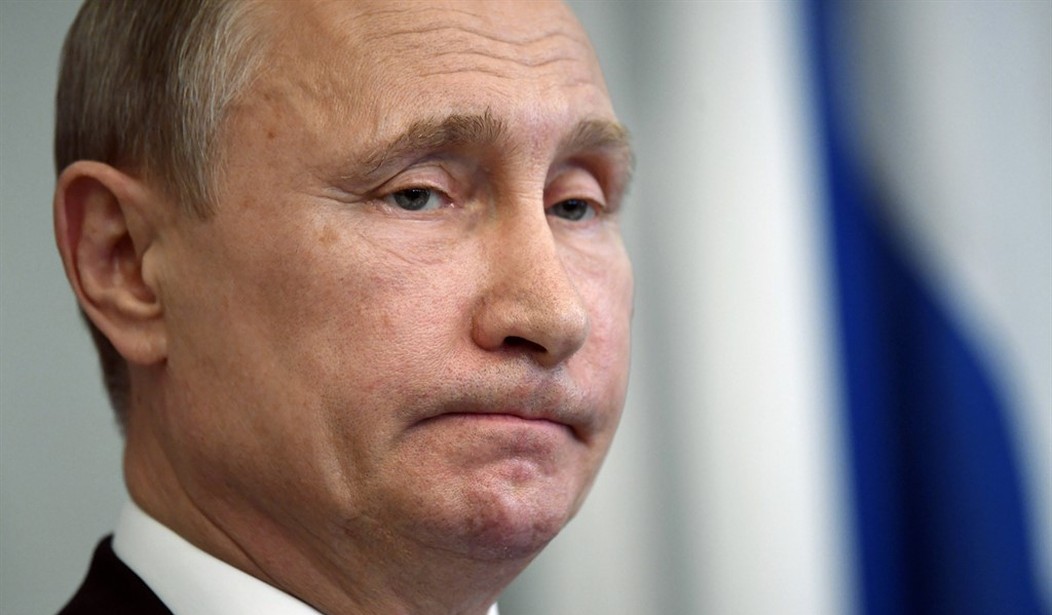Perfectly routine, Sarah Huckabee Sanders insists. He’ll sign the bill. Right, but will he do more than that?
Asked on Monday why Trump had yet to sign the measure, Sanders told reporters at her daily briefing: “There’s nothing holding him back. There’s a review process, a legal process. They’re going through that. And he’ll sign the bill and we’ll let you guys know.”…
Her comments fueled speculation that Trump, who has repeatedly declared his eagerness for better relations with Moscow, could be considering a presidential “signing statement” aimed at watering down the impact of the law. Presidents have regularly used such statements, particularly upon signing measures touching on foreign policy, to reaffirm that they, not Congress, run foreign policy. Doing so in this instance would defy vast bipartisan majorities in both chambers, risking a political backlash…
The legislation is notable in part for the way it restricts the president’s ability to waive key provisions unless Congress signs off. The unusual limits reflected lawmakers’ concerns that Trump aims to ease sanctions using his executive authority.
Team Trump does like signing statements. If you’re late to this subject, this post will get you up to speed on how the bill boxes Trump in, limiting his power to waive sanctions as part of a deal with Moscow by making that waiver subject to a resolution of approval — or disapproval — by Congress. And it’s not just the Republican majority that can introduce a disapproval resolution; the bill empowers the minority leader in the House and Senate to introduce it as well. Trump might be planning to sign it with a signing statement alleging that the disapproval provision infringes on his constitutional authority under Article II to conduct foreign policy on behalf of the United States. If so, that would set up a court fight with Congress potentially if/when he strikes a bargain with Putin that calls for lifting sanctions. Question for legal eagles: Would Schumer and Pelosi have standing to file that suit since the bill gives them the power to bring a resolution of disapproval, or would a majority of the House or Senate need to vote to authorize it?
Whatever the answer, the signing statement won’t solve Trump’s political problem. Waiving sanctions on Russia will intensify the suspicions among anti-Trumpers that he’s in Putin’s pocket unless he gets something very valuable (e.g., withdrawal from Ukraine) in return. Going to court to challenge the constitutionality of an anti-Russia bill passed by huge bipartisan majorities in both chambers in order to waive those sanctions will make the optics that much worse. Unless and until Mueller clears him, there’s no scenario in which Trump lifts sanctions on Russia without Congress’s support that plays well for him domestically. The signing statement is really just a face-saving gesture, I assume. Or maybe he won’t sign it at all. Maybe he’ll just ignore the bill and let it become law via a pocket veto.
Of course, Putin could do enough saber-rattling in eastern Europe that Trump won’t be able to lift sanctions even if he wants to, purely for fear of looking weak under the circumstances. The Kremlin understands that the worst way to bend Trump to their will is to put him in a position where he risks losing a dominance display if he doesn’t respond forcefully. But Putin’s own domestic political needs may not give him the luxury of patience; if he doesn’t slap back at the U.S. over the latest sanctions (as he now has), he loses some of his own strongman authority at home. I can’t see any risk to two nuclear-armed strongmen getting caught in an escalation spiral for fear that pulling out will make one or the other look “weak.”
The Russia sanctions bill also includes sanctions on North Korea, by the way. Here’s Rex Tillerson earlier this afternoon with an unusual message for Pyongyang: We are not your enemy. We do not seek regime change. That’s in line with the State Department’s looming de-emphasis on democracy promotion abroad, but I don’t know what Tillerson’s hoping or expecting will come of it given the Kim’s dynasty insistence on positioning itself as America’s mortal enemy. The “strategy,” such as it is, presumably is to get North Korea back to the bargaining table and … just see what happens. Hope for the best, contrary to 25 years of experience! It beats the alternative, for now.








Join the conversation as a VIP Member